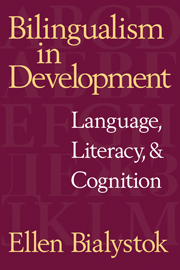3 - And Adding Another
Published online by Cambridge University Press: 02 December 2009
Summary
It is immensely difficult to understand how children learn one language. The competing descriptions each explain only part of the process, so a complete understanding requires integrating pieces from different perspectives. The need to weave together a larger fabric from distinct fragments is not surprising given the complexity of the enterprise and the number of factors that impinge on children's experience in language learning. This complexity is multiplied when one considers the factors relevant to a child's experience in learning two languages.
The questions that one need ask about children learning two languages are different from those guiding the study of monolingual language acquisition but they reflect the same divide between formal and functional paradigms. For example, the difference between simultaneous and sequential acquisition of a second language matters only under certain inter-pretations of the process of first-language acquisition. Applying formalist assumptions, both varieties of second-language acquisition should be similar because they are guided by the mechanism of the language acquisition device and shaped by the constraints of universal grammar. Hence, any input to the child would lead to the construction of the appropriate grammar. Following functionalist assumptions, however, the sequence and timing of second-language acquisition would be different depending on whether the two languages were acquired at the same time or in sequence. In these views, social interaction and previous knowledge drive language acquisition, placing a significant divide between the experiences associated with simultaneous or sequential acquisition of a second language.
- Type
- Chapter
- Information
- Bilingualism in DevelopmentLanguage, Literacy, and Cognition, pp. 56 - 89Publisher: Cambridge University PressPrint publication year: 2001
- 1
- Cited by



